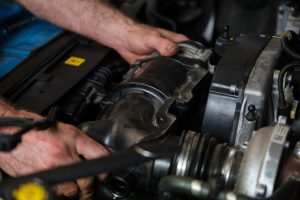Should I repair or replace my transmission based on cost analysis?
What factors should I consider regarding the condition of my transmission?
How does the age of my vehicle impact the decision to repair or replace the transmission?
Why is a professional inspection important when deciding on transmission repairs or replacement?
If you’re facing transmission troubles, making the decision to repair or replace can be daunting. We’ve got your back with essential insights to guide you through this dilemma. From cost considerations and vehicle age to the severity of the issue, we break down key factors that will help you make an informed choice. Plus, we reveal expert tips to aid in your decision-making process.
Ready to tackle your transmission woes head-on? Scroll down for reviews of our top picks to help you decide whether repairing or replacing your transmission is the way to go.
Key Takeaways

Consider the Costs: Evaluate the repair costs versus replacement costs of your transmission to make an informed decision.
Assess Transmission Health: Take into account the current condition of your transmission to determine if repairs are a viable option.
Factor in Vehicle Age: The age of your vehicle plays a significant role in deciding whether to repair or replace the transmission.
Review Warranty Coverage: Check if your vehicle’s warranty covers transmission repairs or replacements to potentially save on costs.
Seek Professional Advice: Get a professional inspection to get an expert opinion on the best course of action for your transmission.
1. Cost Analysis

When facing transmission issues, it’s crucial to assess the cost implications of repairing versus replacing the transmission.
Repair Costs: Repairing a transmission involves fixing the existing issues, which can vary based on the problem and the shop’s labor rates.
Replacement Costs: Replacing a transmission entails installing a new or refurbished unit, which might seem expensive initially but could be more cost-effective in the long run.
Considering long-term expenses is essential when deciding between repair and replacement. Frequent repairs can add up over time, potentially exceeding the cost of a replacement transmission.
To make an informed decision, it’s vital to evaluate the vehicle’s current market value. If the cost of repair is close to or exceeds the car’s worth, investing in a new transmission might be financially wiser in the long term.
2. Transmission Condition
When assessing transmission health, it’s crucial to look for signs of significant damage that could warrant a full replacement instead of just repairs. Inspecting the age and wear of key components such as gears and clutches provides insights into whether repair is a viable option. Analyzing the history of transmission problems in terms of frequency and severity can help in predicting the future reliability post-repairs.
Age and Wear: Evaluating the condition of critical parts like gears and clutches is essential to determine if repairs are feasible or if a complete replacement is necessary.
Past Issue Analysis: Understanding the frequency and severity of previous transmission issues aids in forecasting the potential reliability of the transmission after undergoing repairs.
Signs of Major Damage: Identifying any major damages, such as internal cracks or extensive wear, can indicate that repairing the transmission might not be a cost-effective solution.
3. Vehicle Age
When considering vehicle age in the decision to repair or replace a transmission, it is crucial to assess the overall condition of the vehicle and its potential longevity. Older vehicles may have experienced more wear and tear on the transmission, impacting its performance and lifespan.
One key factor to ponder is how the age of the vehicle influences its resale value. Installing a new transmission in an older car might not significantly increase its resale price, making it less cost-effective. In such cases, opting for a newer model could be a more financially viable option.
Older vehicles are more prone to other mechanical issues due to prolonged use. The engine, heat, and fluid level can all affect the performance of the transmission over time. It’s essential to weigh the potential costs of ongoing repairs against investing in a new transmission or a different vehicle.
When faced with the decision between repairing or replacing a transmission based on vehicle age, consider whether the investment aligns with the remaining lifespan of the vehicle. Sometimes, upgrading to a newer model can provide better value and reliability in the long run.
4. Warranty Coverage
When facing costly repairs or considering a transmission replacement, checking for warranty coverage is crucial. Here’s why:
Financial Relief: A warranty can significantly reduce the financial burden of transmission repairs or replacements, saving you from unexpected expenses.
Peace of Mind: Knowing that your transmission repair or replacement is covered by warranty can provide peace of mind and alleviate stress associated with potential high costs.
Extended Warranties: Some vehicles come with extended warranties beyond the standard manufacturer’s coverage, offering added protection for transmission issues.
Service Plans: Reviewing any additional service plans can also influence your decision-making process. These plans may provide coverage for various transmission issues, ensuring comprehensive care for your vehicle.
Understanding the terms and conditions of your warranty coverage is essential to avoid any surprises during the repair or replacement process. Make sure to:
Check Warranty Status: Verify if your vehicle’s transmission is still under warranty to determine if repairs or replacements are covered.
Review Terms: Familiarize yourself with the specific details of the warranty, including what types of repairs or replacements are included and any limitations on coverage.
Avoid Out-of-Pocket Expenses: By understanding your warranty coverage, you can prevent unexpected out-of-pocket expenses that may arise during transmission repairs or replacements.
Considering warranty coverage before deciding on transmission repairs or replacements can help you make a more informed choice that aligns with your financial well-being and vehicle maintenance needs.
5. Professional Inspection
Seeking a professional inspection is crucial to accurately diagnose your transmission issues. Certified technicians possess the expertise to identify warning signs and determine whether a repair or replacement is necessary.
When facing transmission problems like leaks or unusual smells, it’s essential to pay attention to these issues promptly. A thorough inspection by a skilled mechanic will help pinpoint the specific components that require control or replacement.
Summary
Considering the cost, condition of your transmission, vehicle age, warranty coverage, and the importance of a professional inspection, you now have a comprehensive view to decide whether to repair or replace your transmission. Each factor plays a crucial role in making an informed choice that aligns with your budget and ensures the longevity of your vehicle. Remember, regular maintenance and timely decisions can save you from future headaches and unexpected costs. By weighing these aspects carefully, you can make a confident decision that suits your needs and keeps your vehicle running smoothly for years to come.
Frequently Asked Questions
Should I repair or replace my transmissions based on cost analysis?
If the repair costs are significantly lower than replacement and your vehicle is in good overall condition, repairing might be a cost-effective option. However, if repair costs are high and your vehicle is older, replacing the transmission could be more beneficial in the long run.
What factors should I consider regarding the condition of my transmission, car?
Consider the extent of damage, frequency of issues, and overall performance. If your transmission has frequent problems, extensive damage, or is nearing the end of its lifespan, it may be more practical to opt for a replacement rather than repairs.
How does the age of my vehicle impact the decision to repair or replace the transmission?
For older vehicles with high mileage, investing in a new transmission might be a better long-term solution compared to continuous repairs. Newer vehicles with lower mileage may benefit from repairs unless the cost is exorbitant.
Does warranty coverage play a crucial role in deciding whether to repair or replace the transmission?
Warranty coverage can significantly influence your decision. If your vehicle’s transmission is still under warranty, repairs or replacements may be covered, making it more cost-effective to go through official channels rather than seeking third-party services.
Why is a professional inspection important when deciding on transmission repairs or replacement for your car’s gear?
A professional inspection provides an accurate assessment of your transmission’s condition, helping you make an informed decision. Experts can identify underlying issues, evaluate potential risks, and offer recommendations tailored to your specific situation for optimal results.
